
kaito
Kubernetes AI Toolchain Operator
Stars: 738
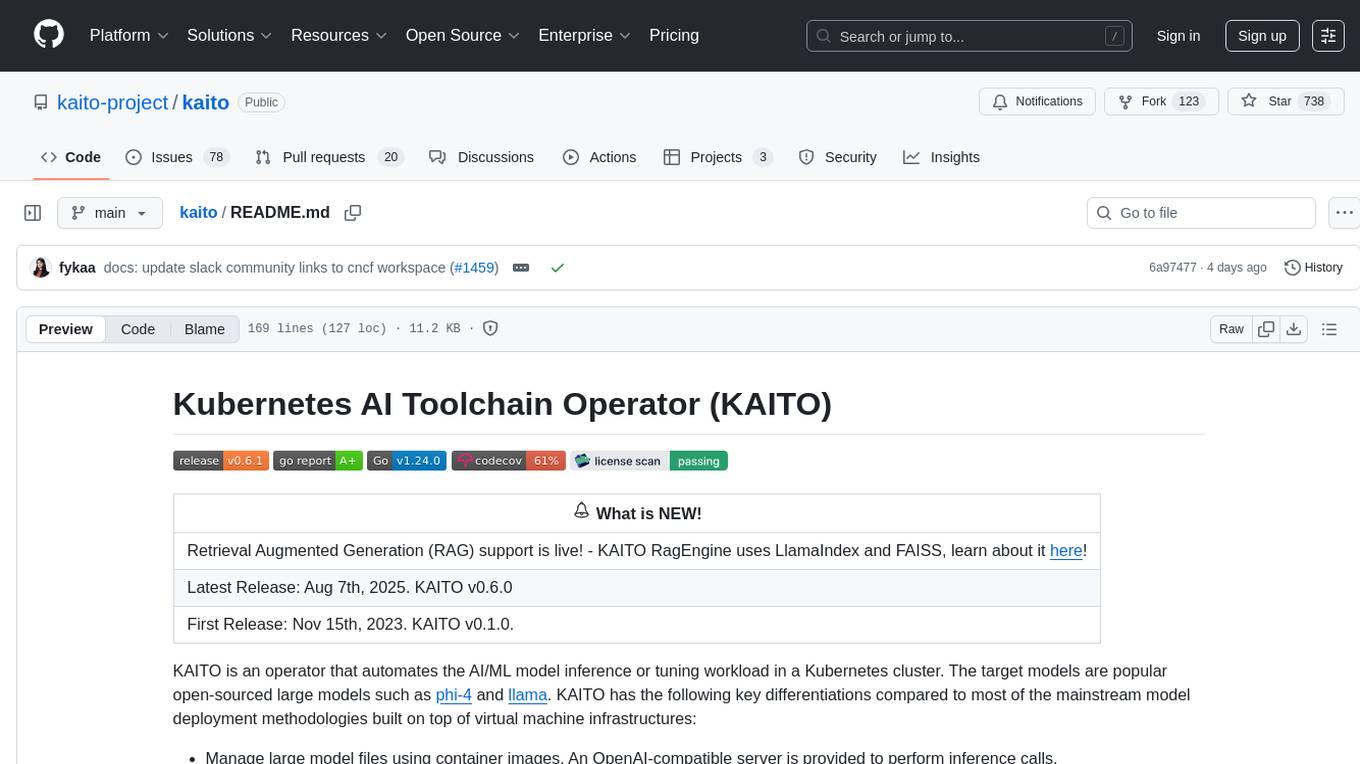
KAITO is an operator that automates the AI/ML model inference or tuning workload in a Kubernetes cluster. It manages large model files using container images, provides preset configurations to avoid adjusting workload parameters based on GPU hardware, supports popular open-sourced inference runtimes, auto-provisions GPU nodes based on model requirements, and hosts large model images in the public Microsoft Container Registry. Using KAITO simplifies the workflow of onboarding large AI inference models in Kubernetes.
README:
 What is NEW! What is NEW! |
|---|
| Retrieval Augmented Generation (RAG) support is live! - KAITO RagEngine uses LlamaIndex and FAISS, learn about it here! |
| Latest Release: Aug 7th, 2025. KAITO v0.6.0 |
| First Release: Nov 15th, 2023. KAITO v0.1.0. |
KAITO is an operator that automates the AI/ML model inference or tuning workload in a Kubernetes cluster. The target models are popular open-sourced large models such as phi-4 and llama. KAITO has the following key differentiations compared to most of the mainstream model deployment methodologies built on top of virtual machine infrastructures:
- Manage large model files using container images. An OpenAI-compatible server is provided to perform inference calls.
- Provide preset configurations to avoid adjusting workload parameters based on GPU hardware.
- Provide support for popular open-sourced inference runtimes: vLLM and transformers.
- Auto-provision GPU nodes based on model requirements.
- Host large model images in the public Microsoft Container Registry (MCR) if the license allows.
Using KAITO, the workflow of onboarding large AI inference models in Kubernetes is largely simplified.
KAITO follows the classic Kubernetes Custom Resource Definition(CRD)/controller design pattern. User manages a workspace custom resource which describes the GPU requirements and the inference or tuning specification. KAITO controllers will automate the deployment by reconciling the workspace custom resource.
The above figure presents the KAITO architecture overview. Its major components consist of:
-
Workspace controller: It reconciles the
workspacecustom resource, createsNodeClaim(explained below) custom resources to trigger node auto provisioning, and creates the inference or tuning workload (deployment,statefulsetorjob) based on the model preset configurations. -
Node provisioner controller: The controller's name is gpu-provisioner in gpu-provisioner helm chart. It uses the
NodeClaimCRD originated from Karpenter to interact with the workspace controller. It integrates with Azure Resource Manager REST APIs to add new GPU nodes to the AKS or AKS Arc cluster.
Note: The gpu-provisioner is an open sourced component. It can be replaced by other controllers if they support Karpenter-core APIs.
NEW! Starting with version v0.5.0, KAITO releases a new operator, RAGEngine, which is used to streamline the process of managing a Retrieval Augmented Generation(RAG) service.
As illustrated in the above figure, the RAGEngine controller reconciles the ragengine custom resource and creates a RAGService deployment. The RAGService provides the following capabilities:
- Orchestration: use LlamaIndex orchestrator.
- Embedding: support both local and remote embedding services, to embed queries and documents in the vector database.
- Vector database: support a built-in faiss in-memory vector database. Remote vector database support will be added soon.
- Backend inference: support any OAI compatible inference service.
The details of the service APIs can be found in this document.
- Workspace: Please check the installation guidance here for deployment using helm and here for deployment using Terraform.
- RAGEngine: Please check the installation guidance here.
After installing KAITO, one can try following commands to start a phi-3.5-mini-instruct inference service.
$ cat examples/inference/kaito_workspace_phi_3.5-instruct.yaml
apiVersion: kaito.sh/v1beta1
kind: Workspace
metadata:
name: workspace-phi-3-5-mini
resource:
instanceType: "Standard_NC24ads_A100_v4"
labelSelector:
matchLabels:
apps: phi-3-5
inference:
preset:
name: phi-3.5-mini-instruct
$ kubectl apply -f examples/inference/kaito_workspace_phi_3.5-instruct.yamlThe workspace status can be tracked by running the following command. When the WORKSPACESUCCEEDED column becomes True, the model has been deployed successfully.
$ kubectl get workspace workspace-phi-3-5-mini
NAME INSTANCE RESOURCEREADY INFERENCEREADY JOBSTARTED WORKSPACESUCCEEDED AGE
workspace-phi-3-5-mini Standard_NC24ads_A100_v4 True True True 4h15mNext, one can find the inference service's cluster ip and use a temporal curl pod to test the service endpoint in the cluster.
# find service endpoint
$ kubectl get svc workspace-phi-3-5-mini
NAME TYPE CLUSTER-IP EXTERNAL-IP PORT(S) AGE
workspace-phi-3-5-mini ClusterIP <CLUSTERIP> <none> 80/TCP,29500/TCP 10m
$ export CLUSTERIP=$(kubectl get svc workspace-phi-3-5-mini -o jsonpath="{.spec.clusterIPs[0]}")
# find available models
$ kubectl run -it --rm --restart=Never curl --image=curlimages/curl -- curl -s http://$CLUSTERIP/v1/models | jq
{
"object": "list",
"data": [
{
"id": "phi-3.5-mini-instruct",
"object": "model",
"created": 1733370094,
"owned_by": "vllm",
"root": "/workspace/vllm/weights",
"parent": null,
"max_model_len": 16384
}
]
}
# make an inference call using the model id (phi-3.5-mini-instruct) from previous step
$ kubectl run -it --rm --restart=Never curl --image=curlimages/curl -- curl -X POST http://$CLUSTERIP/v1/chat/completions \
-H "Content-Type: application/json" \
-d '{
"model": "phi-3.5-mini-instruct",
"messages": [{"role": "user", "content": "What is kubernetes?"}],
"max_tokens": 50,
"temperature": 0
}'The detailed usage for KAITO supported models can be found in HERE. In case users want to deploy their own containerized models, they can provide the pod template in the inference field of the workspace custom resource (please see API definitions for details).
Note: Currently the controller does NOT handle automatic model upgrade. It only creates inference workloads based on the preset configurations if the workloads do not exist.
The number of the supported models in KAITO is growing! Please check this document to see how to add a new supported model. Refer to tuning document, inference document , RAGEngine document and FAQ for more information.
This project welcomes contributions and suggestions. The contributions require you to agree to a Contributor License Agreement (CLA) declaring that you have the right to, and actually do, grant us the rights to use your contribution. For details, visit CLAs for CNCF.
When you submit a pull request, a CLA bot will automatically determine whether you need to provide a CLA and decorate the PR appropriately (e.g., status check, comment). Simply follow the instructions provided by the bot. You will only need to do this once across all repos using our CLA.
This project has adopted the CLAs for CNCF, please electronically sign the CLA via https://easycla.lfx.linuxfoundation.org. If you encounter issues, you can submit a ticket with the Linux Foundation ID group through the Linux Foundation Support website.
- Visit #kaito channel in CNCF Slack to discuss features in development and proposals.
- We host a weekly community meeting for contributors on Tuesdays at 4:00pm PST. Please join here: meeting link.
- Reference the weekly meeting notes in our KAITO community calls doc!
See Apache License 2.0.
KAITO has adopted the Cloud Native Compute Foundation Code of Conduct. For more information see the KAITO Code of Conduct.
- Please send emails to "KAITO devs" [email protected] for any issues.
For Tasks:
Click tags to check more tools for each tasksFor Jobs:
Alternative AI tools for kaito
Similar Open Source Tools

kaito
KAITO is an operator that automates the AI/ML model inference or tuning workload in a Kubernetes cluster. It manages large model files using container images, provides preset configurations to avoid adjusting workload parameters based on GPU hardware, supports popular open-sourced inference runtimes, auto-provisions GPU nodes based on model requirements, and hosts large model images in the public Microsoft Container Registry. Using KAITO simplifies the workflow of onboarding large AI inference models in Kubernetes.

deep-research
Deep Research is a lightning-fast tool that uses powerful AI models to generate comprehensive research reports in just a few minutes. It leverages advanced 'Thinking' and 'Task' models, combined with an internet connection, to provide fast and insightful analysis on various topics. The tool ensures privacy by processing and storing all data locally. It supports multi-platform deployment, offers support for various large language models, web search functionality, knowledge graph generation, research history preservation, local and server API support, PWA technology, multi-key payload support, multi-language support, and is built with modern technologies like Next.js and Shadcn UI. Deep Research is open-source under the MIT License.
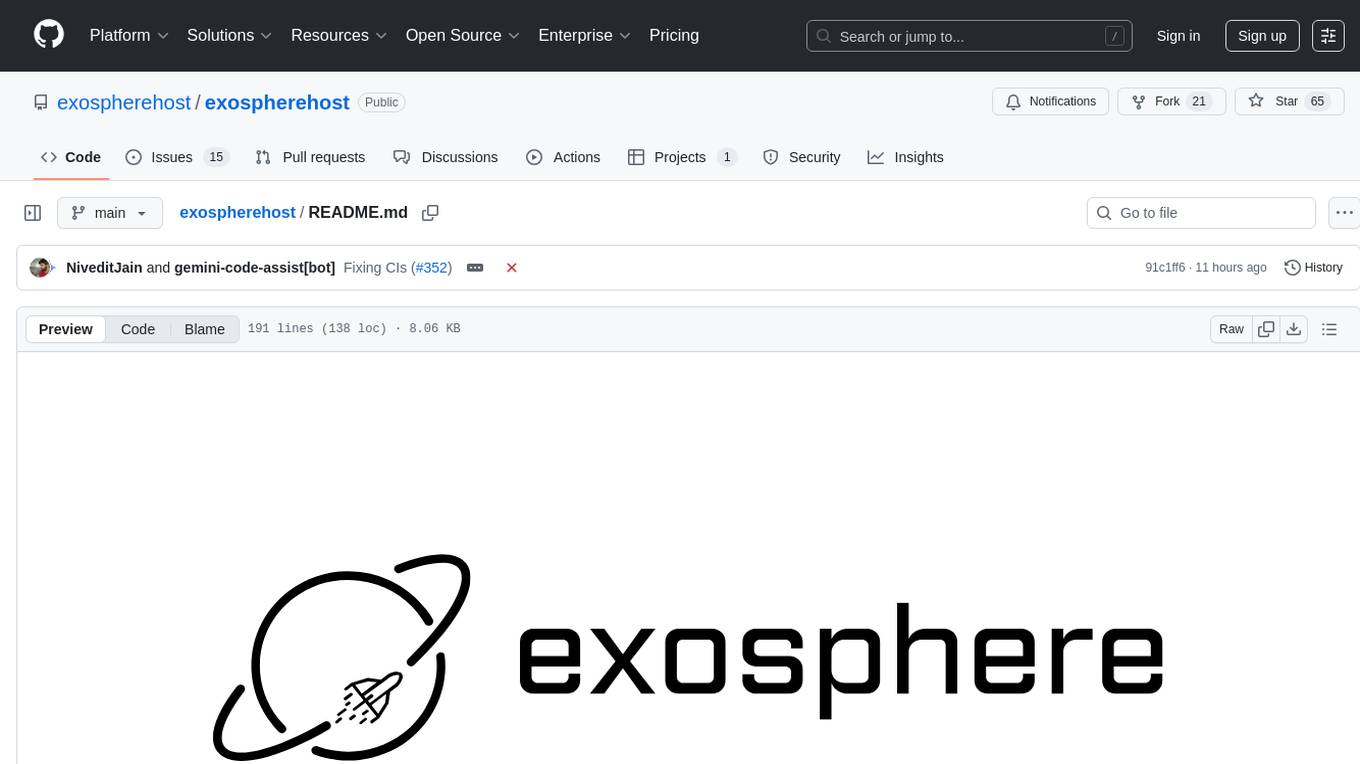
exospherehost
Exosphere is an open source infrastructure designed to run AI agents at scale for large data and long running flows. It allows developers to define plug and playable nodes that can be run on a reliable backbone in the form of a workflow, with features like dynamic state creation at runtime, infinite parallel agents, persistent state management, and failure handling. This enables the deployment of production agents that can scale beautifully to build robust autonomous AI workflows.

BentoML
BentoML is an open-source model serving library for building performant and scalable AI applications with Python. It comes with everything you need for serving optimization, model packaging, and production deployment.
aiconfig
AIConfig is a framework that makes it easy to build generative AI applications for production. It manages generative AI prompts, models and model parameters as JSON-serializable configs that can be version controlled, evaluated, monitored and opened in a local editor for rapid prototyping. It allows you to store and iterate on generative AI behavior separately from your application code, offering a streamlined AI development workflow.

web-llm
WebLLM is a modular and customizable javascript package that directly brings language model chats directly onto web browsers with hardware acceleration. Everything runs inside the browser with no server support and is accelerated with WebGPU. WebLLM is fully compatible with OpenAI API. That is, you can use the same OpenAI API on any open source models locally, with functionalities including json-mode, function-calling, streaming, etc. We can bring a lot of fun opportunities to build AI assistants for everyone and enable privacy while enjoying GPU acceleration.

Biomni
Biomni is a general-purpose biomedical AI agent designed to autonomously execute a wide range of research tasks across diverse biomedical subfields. By integrating cutting-edge large language model (LLM) reasoning with retrieval-augmented planning and code-based execution, Biomni helps scientists dramatically enhance research productivity and generate testable hypotheses.
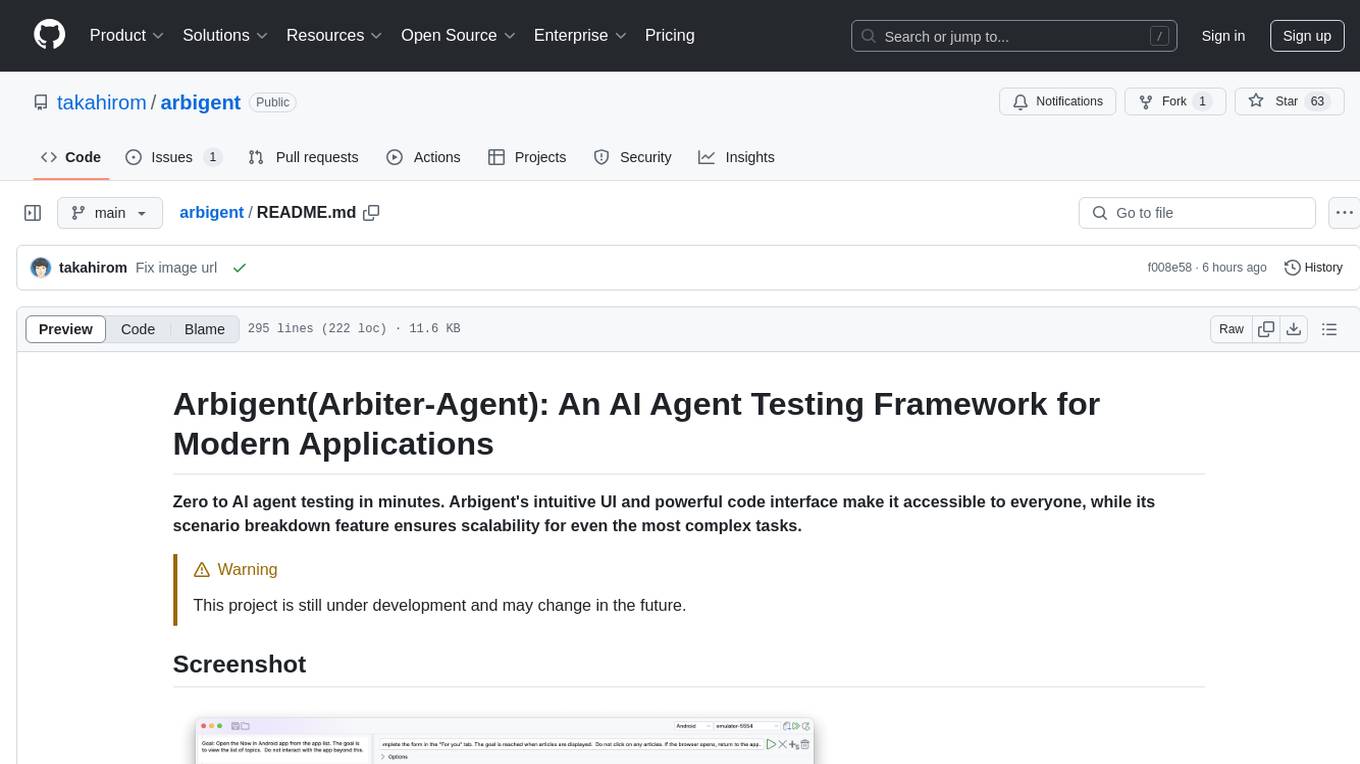
arbigent
Arbigent (Arbiter-Agent) is an AI agent testing framework designed to make AI agent testing practical for modern applications. It addresses challenges faced by traditional UI testing frameworks and AI agents by breaking down complex tasks into smaller, dependent scenarios. The framework is customizable for various AI providers, operating systems, and form factors, empowering users with extensive customization capabilities. Arbigent offers an intuitive UI for scenario creation and a powerful code interface for seamless test execution. It supports multiple form factors, optimizes UI for AI interaction, and is cost-effective by utilizing models like GPT-4o mini. With a flexible code interface and open-source nature, Arbigent aims to revolutionize AI agent testing in modern applications.
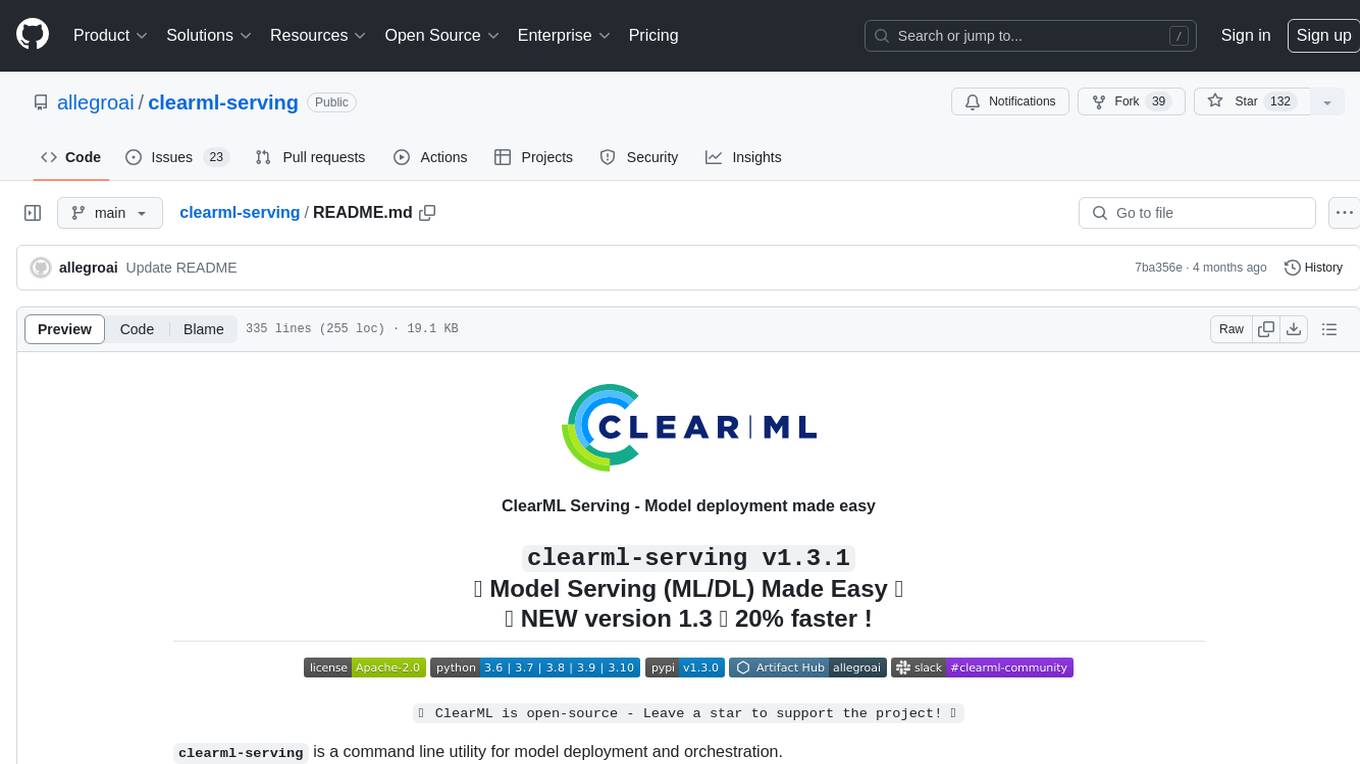
clearml-serving
ClearML Serving is a command line utility for model deployment and orchestration, enabling model deployment including serving and preprocessing code to a Kubernetes cluster or custom container based solution. It supports machine learning models like Scikit Learn, XGBoost, LightGBM, and deep learning models like TensorFlow, PyTorch, ONNX. It provides a customizable RestAPI for serving, online model deployment, scalable solutions, multi-model per container, automatic deployment, canary A/B deployment, model monitoring, usage metric reporting, metric dashboard, and model performance metrics. ClearML Serving is modular, scalable, flexible, customizable, and open source.
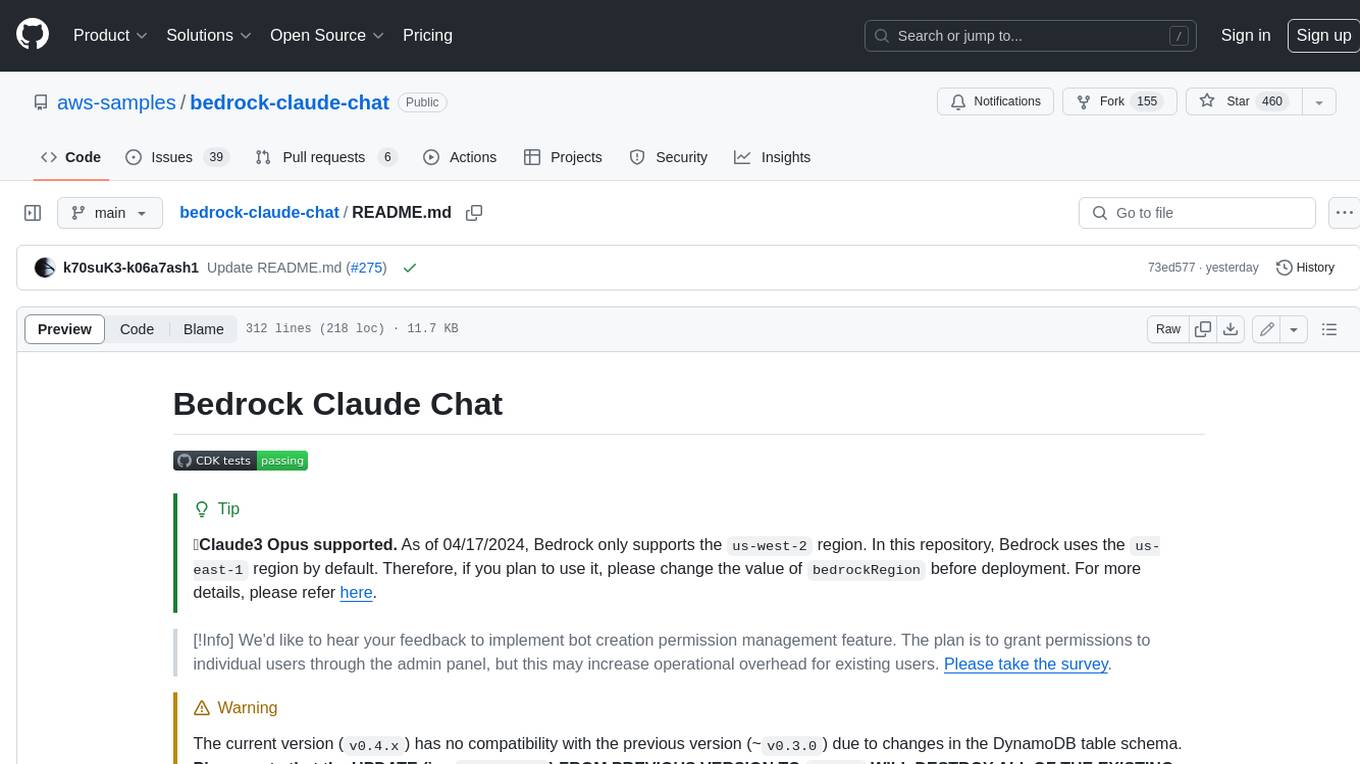
bedrock-claude-chat
This repository is a sample chatbot using the Anthropic company's LLM Claude, one of the foundational models provided by Amazon Bedrock for generative AI. It allows users to have basic conversations with the chatbot, personalize it with their own instructions and external knowledge, and analyze usage for each user/bot on the administrator dashboard. The chatbot supports various languages, including English, Japanese, Korean, Chinese, French, German, and Spanish. Deployment is straightforward and can be done via the command line or by using AWS CDK. The architecture is built on AWS managed services, eliminating the need for infrastructure management and ensuring scalability, reliability, and security.
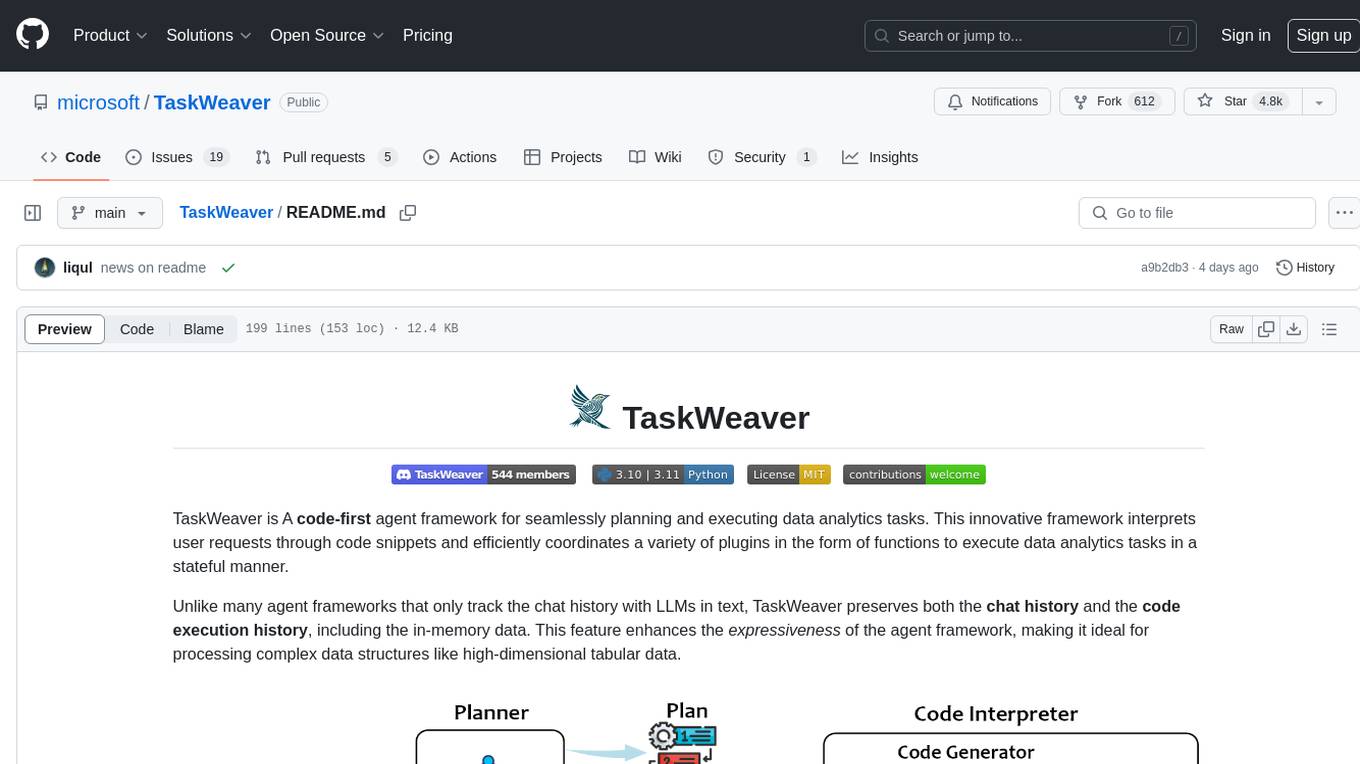
TaskWeaver
TaskWeaver is a code-first agent framework designed for planning and executing data analytics tasks. It interprets user requests through code snippets, coordinates various plugins to execute tasks in a stateful manner, and preserves both chat history and code execution history. It supports rich data structures, customized algorithms, domain-specific knowledge incorporation, stateful execution, code verification, easy debugging, security considerations, and easy extension. TaskWeaver is easy to use with CLI and WebUI support, and it can be integrated as a library. It offers detailed documentation, demo examples, and citation guidelines.
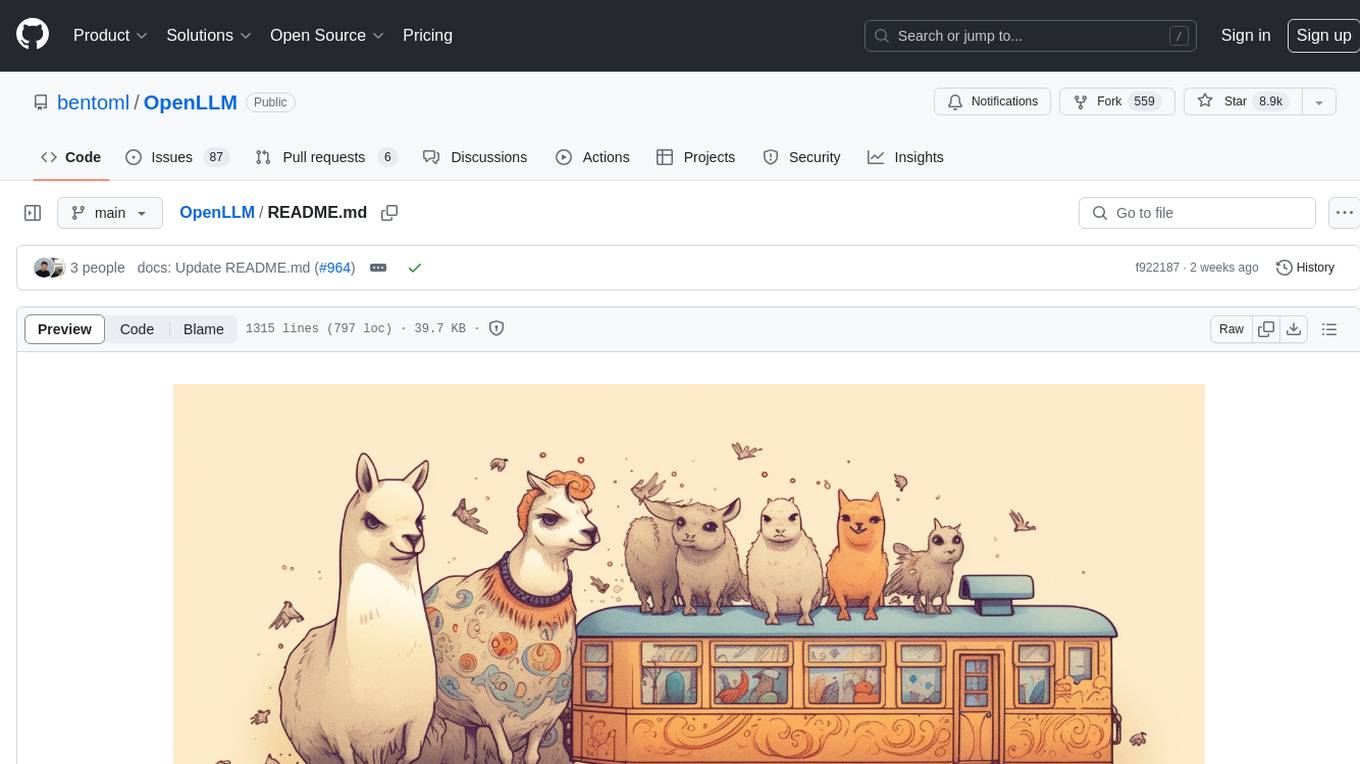
OpenLLM
OpenLLM is a platform that helps developers run any open-source Large Language Models (LLMs) as OpenAI-compatible API endpoints, locally and in the cloud. It supports a wide range of LLMs, provides state-of-the-art serving and inference performance, and simplifies cloud deployment via BentoML. Users can fine-tune, serve, deploy, and monitor any LLMs with ease using OpenLLM. The platform also supports various quantization techniques, serving fine-tuning layers, and multiple runtime implementations. OpenLLM seamlessly integrates with other tools like OpenAI Compatible Endpoints, LlamaIndex, LangChain, and Transformers Agents. It offers deployment options through Docker containers, BentoCloud, and provides a community for collaboration and contributions.

Trace
Trace is a new AutoDiff-like tool for training AI systems end-to-end with general feedback. It generalizes the back-propagation algorithm by capturing and propagating an AI system's execution trace. Implemented as a PyTorch-like Python library, users can write Python code directly and use Trace primitives to optimize certain parts, similar to training neural networks.
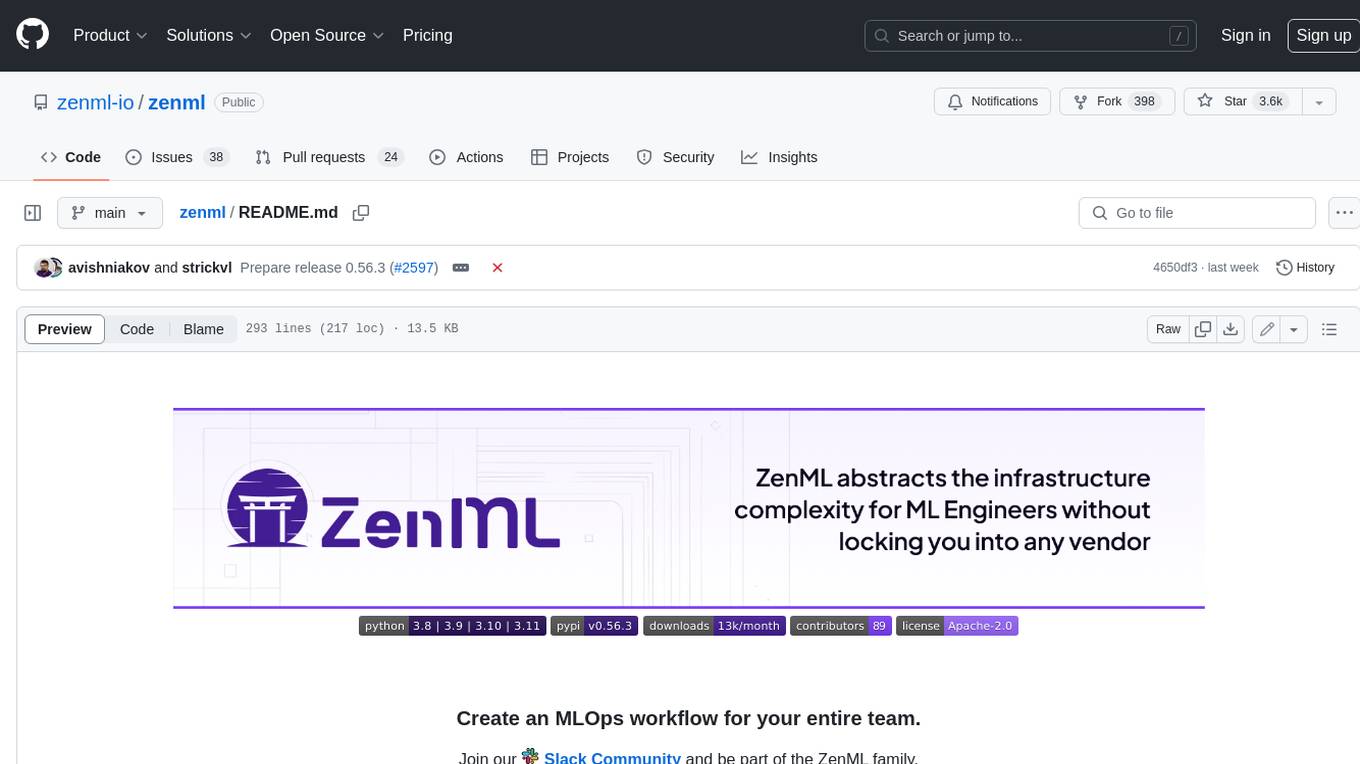
zenml
ZenML is an extensible, open-source MLOps framework for creating portable, production-ready machine learning pipelines. By decoupling infrastructure from code, ZenML enables developers across your organization to collaborate more effectively as they develop to production.
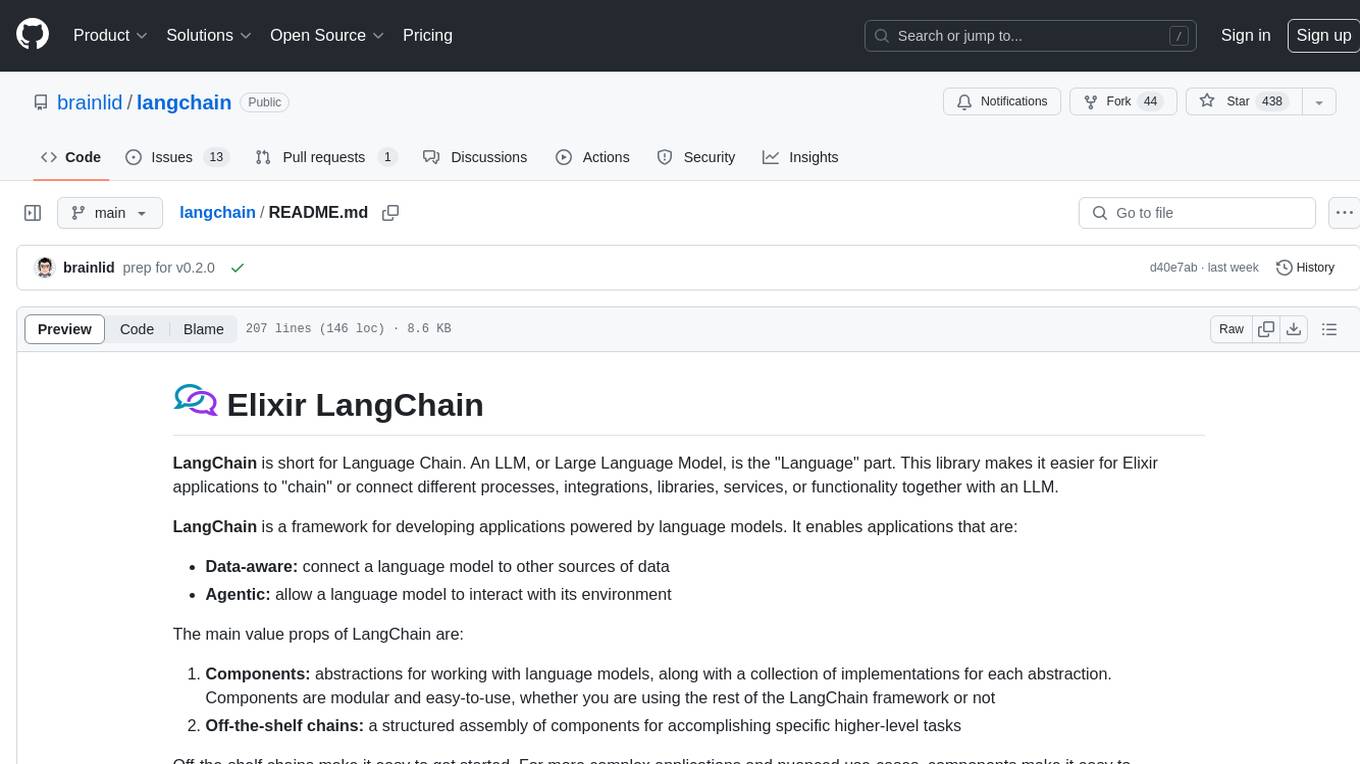
langchain
LangChain is a framework for developing Elixir applications powered by language models. It enables applications to connect language models to other data sources and interact with the environment. The library provides components for working with language models and off-the-shelf chains for specific tasks. It aims to assist in building applications that combine large language models with other sources of computation or knowledge. LangChain is written in Elixir and is not aimed for parity with the JavaScript and Python versions due to differences in programming paradigms and design choices. The library is designed to make it easy to integrate language models into applications and expose features, data, and functionality to the models.
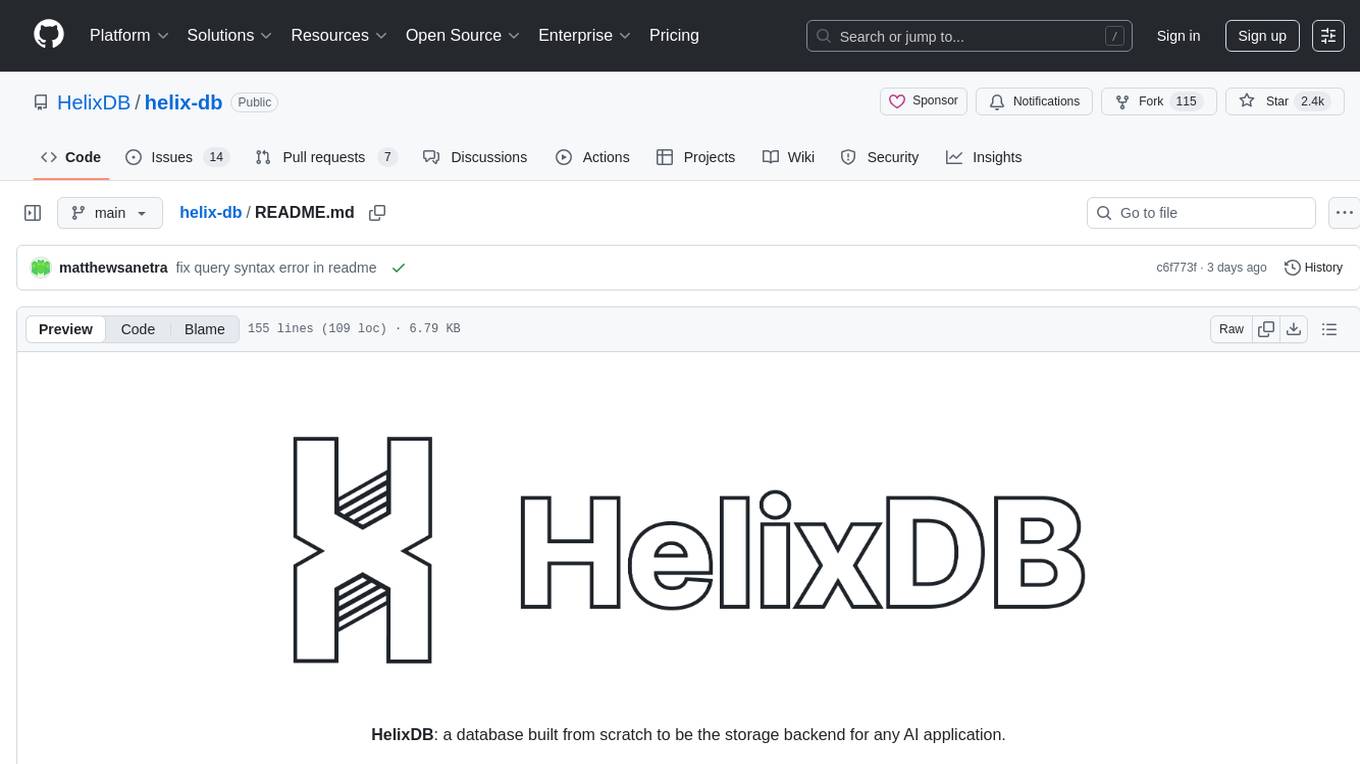
helix-db
HelixDB is a database designed specifically for AI applications, providing a single platform to manage all components needed for AI applications. It supports graph + vector data model and also KV, documents, and relational data. Key features include built-in tools for MCP, embeddings, knowledge graphs, RAG, security, logical isolation, and ultra-low latency. Users can interact with HelixDB using the Helix CLI tool and SDKs in TypeScript and Python. The roadmap includes features like organizational auth, server code improvements, 3rd party integrations, educational content, and binary quantisation for better performance. Long term projects involve developing in-house tools for knowledge graph ingestion, graph-vector storage engine, and network protocol & serdes libraries.
For similar tasks

kaito
KAITO is an operator that automates the AI/ML model inference or tuning workload in a Kubernetes cluster. It manages large model files using container images, provides preset configurations to avoid adjusting workload parameters based on GPU hardware, supports popular open-sourced inference runtimes, auto-provisions GPU nodes based on model requirements, and hosts large model images in the public Microsoft Container Registry. Using KAITO simplifies the workflow of onboarding large AI inference models in Kubernetes.

ai-on-gke
This repository contains assets related to AI/ML workloads on Google Kubernetes Engine (GKE). Run optimized AI/ML workloads with Google Kubernetes Engine (GKE) platform orchestration capabilities. A robust AI/ML platform considers the following layers: Infrastructure orchestration that support GPUs and TPUs for training and serving workloads at scale Flexible integration with distributed computing and data processing frameworks Support for multiple teams on the same infrastructure to maximize utilization of resources

ray
Ray is a unified framework for scaling AI and Python applications. It consists of a core distributed runtime and a set of AI libraries for simplifying ML compute, including Data, Train, Tune, RLlib, and Serve. Ray runs on any machine, cluster, cloud provider, and Kubernetes, and features a growing ecosystem of community integrations. With Ray, you can seamlessly scale the same code from a laptop to a cluster, making it easy to meet the compute-intensive demands of modern ML workloads.

labelbox-python
Labelbox is a data-centric AI platform for enterprises to develop, optimize, and use AI to solve problems and power new products and services. Enterprises use Labelbox to curate data, generate high-quality human feedback data for computer vision and LLMs, evaluate model performance, and automate tasks by combining AI and human-centric workflows. The academic & research community uses Labelbox for cutting-edge AI research.

djl
Deep Java Library (DJL) is an open-source, high-level, engine-agnostic Java framework for deep learning. It is designed to be easy to get started with and simple to use for Java developers. DJL provides a native Java development experience and allows users to integrate machine learning and deep learning models with their Java applications. The framework is deep learning engine agnostic, enabling users to switch engines at any point for optimal performance. DJL's ergonomic API interface guides users with best practices to accomplish deep learning tasks, such as running inference and training neural networks.

mlflow
MLflow is a platform to streamline machine learning development, including tracking experiments, packaging code into reproducible runs, and sharing and deploying models. MLflow offers a set of lightweight APIs that can be used with any existing machine learning application or library (TensorFlow, PyTorch, XGBoost, etc), wherever you currently run ML code (e.g. in notebooks, standalone applications or the cloud). MLflow's current components are:
* `MLflow Tracking

tt-metal
TT-NN is a python & C++ Neural Network OP library. It provides a low-level programming model, TT-Metalium, enabling kernel development for Tenstorrent hardware.

burn
Burn is a new comprehensive dynamic Deep Learning Framework built using Rust with extreme flexibility, compute efficiency and portability as its primary goals.
For similar jobs

sweep
Sweep is an AI junior developer that turns bugs and feature requests into code changes. It automatically handles developer experience improvements like adding type hints and improving test coverage.

teams-ai
The Teams AI Library is a software development kit (SDK) that helps developers create bots that can interact with Teams and Microsoft 365 applications. It is built on top of the Bot Framework SDK and simplifies the process of developing bots that interact with Teams' artificial intelligence capabilities. The SDK is available for JavaScript/TypeScript, .NET, and Python.

ai-guide
This guide is dedicated to Large Language Models (LLMs) that you can run on your home computer. It assumes your PC is a lower-end, non-gaming setup.

classifai
Supercharge WordPress Content Workflows and Engagement with Artificial Intelligence. Tap into leading cloud-based services like OpenAI, Microsoft Azure AI, Google Gemini and IBM Watson to augment your WordPress-powered websites. Publish content faster while improving SEO performance and increasing audience engagement. ClassifAI integrates Artificial Intelligence and Machine Learning technologies to lighten your workload and eliminate tedious tasks, giving you more time to create original content that matters.

chatbot-ui
Chatbot UI is an open-source AI chat app that allows users to create and deploy their own AI chatbots. It is easy to use and can be customized to fit any need. Chatbot UI is perfect for businesses, developers, and anyone who wants to create a chatbot.

BricksLLM
BricksLLM is a cloud native AI gateway written in Go. Currently, it provides native support for OpenAI, Anthropic, Azure OpenAI and vLLM. BricksLLM aims to provide enterprise level infrastructure that can power any LLM production use cases. Here are some use cases for BricksLLM: * Set LLM usage limits for users on different pricing tiers * Track LLM usage on a per user and per organization basis * Block or redact requests containing PIIs * Improve LLM reliability with failovers, retries and caching * Distribute API keys with rate limits and cost limits for internal development/production use cases * Distribute API keys with rate limits and cost limits for students

uAgents
uAgents is a Python library developed by Fetch.ai that allows for the creation of autonomous AI agents. These agents can perform various tasks on a schedule or take action on various events. uAgents are easy to create and manage, and they are connected to a fast-growing network of other uAgents. They are also secure, with cryptographically secured messages and wallets.

griptape
Griptape is a modular Python framework for building AI-powered applications that securely connect to your enterprise data and APIs. It offers developers the ability to maintain control and flexibility at every step. Griptape's core components include Structures (Agents, Pipelines, and Workflows), Tasks, Tools, Memory (Conversation Memory, Task Memory, and Meta Memory), Drivers (Prompt and Embedding Drivers, Vector Store Drivers, Image Generation Drivers, Image Query Drivers, SQL Drivers, Web Scraper Drivers, and Conversation Memory Drivers), Engines (Query Engines, Extraction Engines, Summary Engines, Image Generation Engines, and Image Query Engines), and additional components (Rulesets, Loaders, Artifacts, Chunkers, and Tokenizers). Griptape enables developers to create AI-powered applications with ease and efficiency.



